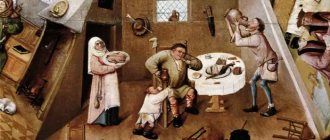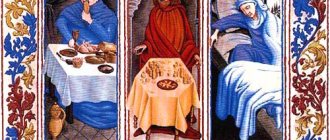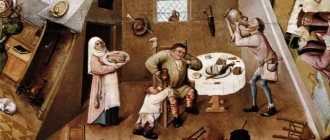Author: Stanislav Ogryzkov Published: 03/09/2005
In this short article I will not pretend to be an absolutist statement, including that Christianity is somehow more important than other world religions. Therefore, I reject in advance all possible attacks in this vein. The purpose of the article is to provide information about the seven deadly sins and ten commandments noted in Christian teaching. The degree of sinfulness and importance of the commandments can be disputed, but at a minimum it is worth paying attention to.
But first, why did I suddenly decide to write about this? The reason for this was the film “Seven,” in which one comrade imagined himself to be an instrument of God and decided to punish selected individuals, as they say, point by point, that is, each for some mortal sin. It’s just that I suddenly discovered, to my shame, that I couldn’t list all seven deadly sins. So I decided to fill this gap by publishing on my website. And in the process of searching for information, I discovered a connection with the Ten Christian Commandments (which also doesn’t hurt to know), as well as some other interesting materials. Below it all comes together.
What is sin?
Photo: Flickr.com
In order to win, you need to know the enemy by sight. How many modern people know what sin is and what acts are considered the most serious? Do they understand what needs to be fought and why? Do they believe that the human soul is so valuable that every minute there is a struggle between Light and darkness precisely for it.
The most comprehensive concept of sin is given in the New Testament. Sin is lawlessness, which is expressed in non-compliance with God's commandments and the laws of Genesis established by the Lord for people. The commandments were given to people so that they could coexist peacefully, and not create chaos. But for people the commandments of the Lord are not obvious; they do not remember them, although they have heard them repeatedly.
But everyone knows what a Constitution or Code is, and everyone also understands that many sets of laws were invented by people in order to maintain order and stability in society. God's commandments have almost the same purpose, but in a deeper sense, because worldly laws protect property, and God's laws protect our soul.
Part 1. Christian psychology
"The Ladder" by St. John Climacus
In the old days in Rus', the favorite reading was always “The Philokalia”, “The Ladder” of St. John Climacus and other soul-helping books.
Modern Orthodox Christians, unfortunately, rarely pick up these great books. It's a pity! After all, they contain answers to questions that are often asked in confession today: “Father, how not to get irritated?”, “Father, how to deal with despondency and laziness?”, “How to live in peace with loved ones?”, “Why?” Do we keep returning to the same sins? Every priest has to hear these and other questions. These questions are answered by theological science, which is called asceticism
. She talks about what passions and sins are, how to fight them, how to find peace of mind, how to acquire love for God and neighbors.
The word “asceticism” immediately evokes associations with ancient ascetics, Egyptian hermits, and monasteries. And in general, ascetic experiences and the struggle with passions are considered by many to be a purely monastic matter: we, they say, are weak people, we live in the world, that’s just how we are... This, of course, is a deep misconception. Every Orthodox Christian, without exception, is called to daily struggle, war against passions and sinful habits. The Apostle Paul tells us about this: “Those who are Christ’s (that is, all Christians. - Author.
) crucified the flesh with its passions and lusts” (Gal. 5:24). Just as soldiers take an oath and make a solemn promise - an oath - to defend the Fatherland and crush its enemies, so a Christian, as a warrior of Christ, in the sacrament of baptism swears allegiance to Christ and “renounces the devil and all his works,” that is, sin. This means there will be a battle with these fierce enemies of our salvation - fallen angels, passions and sins. A life-or-death battle, a difficult and daily, if not hourly, battle. Therefore, “we only dream of peace.”
I will take the liberty to say that asceticism can be called, in some way, Christian psychology. After all, the word “psychology” translated from Greek means “the science of the soul.” This is a science that studies the mechanisms of human behavior and thinking. Practical psychology helps a person cope with his bad tendencies, overcome depression, and learn to get along with himself and people. As we see, the objects of attention of asceticism and psychology are the same.
Saint Theophan the Recluse said that it was necessary to compile a textbook on Christian psychology, and he himself used psychological analogies in his instructions to questioners. The trouble is that psychology is not a single scientific discipline, such as physics, mathematics, chemistry or biology. There are many schools and areas that call themselves psychology. Psychology includes psychoanalysis by Freud and Jung, and newfangled movements like neurolinguistic programming (NLP). Some trends in psychology are completely unacceptable for Orthodox Christians. Therefore, we have to collect some knowledge bit by bit, separating the wheat from the chaff.
I will try, using some knowledge from practical, applied psychology, to rethink them in accordance with the teaching of the Holy Fathers on the fight against passions.
Before we start talking about the main passions and methods of dealing with them, let's ask ourselves the question: “Why do we fight our sins and passions?” Recently I heard one famous Orthodox theologian, a professor at the Moscow Theological Academy (I will not name him, because I respect him very much; he was my teacher, but in this case I fundamentally disagree with him) said: “Divine service, prayer, fasting is all, so to speak, scaffolding, supports for the construction of the building of salvation, but not the goal of salvation, not the meaning of Christian life. And the goal is to get rid of passions.” I cannot agree with this, since deliverance from passions is also not an end in itself, but the Venerable Seraphim of Sarov speaks about the true goal: “Acquire a peaceful spirit - and thousands around you will be saved.” That is, the goal of a Christian’s life is to acquire love for God and neighbors. The Lord Himself speaks of only two commandments, on which the entire law and prophets are based. This is “thou shalt love the Lord thy God
with all thy heart, and with all thy soul, and with all thy mind”
and
“thou shalt love thy neighbor as thyself”
(Matthew 22:37, 39).
Christ did not say that these were simply two of the ten or twenty other commandments, but said that “on these two commandments hang all the law and the prophets”
(Matthew 22:40). These are the most important commandments, the fulfillment of which is the meaning and purpose of Christian life. And getting rid of passions is also only a means, like prayer, worship and fasting. If getting rid of passions were the goal of a Christian, then we would not be far from Buddhists, who also seek dispassion - nirvana.
It is impossible for a person to fulfill the two main commandments while passions dominate over him. A person subject to passions and sins loves himself and his passion. How can a vain, proud person love God and his neighbors? And the one who is in despondency, anger, serving the love of money? The questions are rhetorical.
Serving passions and sin does not allow a Christian to fulfill the most important, key commandment of the New Testament - the commandment of love.
Passions and suffering
From the Church Slavonic language the word “passion” is translated as “suffering”. Hence, for example, the word “passion-bearer,” that is, one who endures suffering and torment. And indeed, nothing torments people more: neither illnesses nor anything else, than their own passions, deep-rooted sins.
First, passions serve to satisfy the sinful needs of people, and then people themselves begin to serve them: “Everyone who commits sin is a slave of sin” (John 8:34).
Of course, in every passion there is an element of sinful pleasure for a person, but, nevertheless, passions torment, torment and enslave the sinner.
The most striking examples of passionate addiction are alcoholism and drug addiction. The need for alcohol or drugs not only enslaves a person’s soul, but alcohol and drugs become a necessary component of his metabolism, part of the biochemical processes in his body. Addiction to alcohol or drugs is a spiritual-physical addiction. And it needs to be treated in two ways, that is, by treating both the soul and the body. But at the core is sin, passion. An alcoholic or drug addict's family falls apart, he is kicked out of work, he loses friends, but he sacrifices all this to passion. A person addicted to alcohol or drugs is ready to commit any crime to satisfy his passion. No wonder 90% of crimes are committed under the influence of alcohol and drugs. That's how strong the demon of drunkenness is!
Other passions can enslave the soul no less. But with alcoholism and drug addiction, the enslavement of the soul is further intensified by bodily dependence.
People who are far from the Church and from spiritual life often see only prohibitions in Christianity. They say they came up with some taboos and restrictions to make life more difficult for people. But in Orthodoxy there is nothing accidental or superfluous, everything is very harmonious and natural. The spiritual world, as well as the physical world, has its own laws, which, like the laws of nature, cannot be violated, otherwise it will lead to damage and even disaster. Some of these laws are expressed in commandments that protect us from harm. Commandments and moral instructions can be compared to signs warning of danger: “Caution, high voltage!”, “Don’t get involved, it will kill you!”, “Stop! Radiation contamination zone" and the like, or with inscriptions on containers with toxic liquids: "Poisonous", "Toxic" and so on. We, of course, are given freedom of choice, but if we do not pay attention to the alarming signs, then we will only have to take offense at ourselves. Sin is a violation of very subtle and strict laws of spiritual nature, and it causes harm, first of all, to the sinner himself. And in the case of passions, the harm from sin increases many times over, because sin becomes permanent and takes on the character of a chronic disease.
The word "passion" has two meanings.
Firstly, as the Monk John of the Climacus says, “passion is the name given to the very vice that has been embedded in the soul for a long time and through habit has become, as it were, a natural property of it, so that the soul already voluntarily and by itself strives towards it” (Ladder. 15: 75). That is, passion is already something more than sin, it is sinful dependence, slavery to a certain type of vice.
Secondly, the word “passion” is a name that unites a whole group of sins. For example, in the book “The Eight Main Passions with Their Divisions and Branches,” compiled by St. Ignatius (Brianchaninov), eight passions are listed, and after each there is a whole list of sins united by this passion. For example, anger:
hot temper, acceptance of angry thoughts, dreams of anger and revenge, indignation of the heart with rage, darkening of his mind, incessant shouting, arguing, swear words, stress, pushing, murder, memory malice, hatred, enmity, revenge, slander, condemnation, indignation and resentment of one's neighbor .
Most holy fathers speak of eight passions:
1. gluttony, 2. fornication, 3. love of money, 4. anger, 5. sadness, 6. despondency, 7. vanity, 8. pride.
Some, speaking about passions, combine sadness and despondency. Actually, these are somewhat different passions, but we will talk about this below.
Sometimes the eight passions are called mortal sins.
Passions have this name because they can (if they completely take over a person) disrupt spiritual life, deprive them of salvation and lead to eternal death. According to the holy fathers, behind every passion there is a certain demon, dependence on which makes a person captive to a certain vice. This teaching is rooted in the Gospel: “When the unclean spirit leaves a man, he walks through dry places, seeking rest, and not finding it, he says: I will return to my house from whence I came, and when he comes, he finds it swept and tidied up; then he goes and takes with him seven other spirits more evil than himself, and they enter and live there, and the last thing for that person is worse than the first” (Luke 11: 24-26).
Western theologians, for example Thomas Aquinas, usually write about the seven passions. In the West, in general, the number “seven” is given special significance.
Passions are a perversion of natural human properties and needs. In human nature there is a need for food and drink, a desire for procreation. Anger can be righteous (for example, towards enemies of faith and the Fatherland), or it can lead to murder. Thrift can degenerate into love of money. We mourn the loss of loved ones, but this should not develop into despair. Purposefulness and perseverance should not lead to pride.
One Western theologian gives a very successful example. He compares passion to a dog. It’s very good when a dog sits on a chain and guards our house, but it’s a disaster when he climbs his paws onto the table and devours our lunch.
Saint John Cassian the Roman says that passions are divided into spiritual,
that is, coming from mental inclinations, for example: anger, despondency, pride, etc.
They feed the soul. And bodily:
they are born in the body and nourish the body. But since a person is spiritual and physical, passions destroy both soul and body.
The same saint writes that the first six passions seem to arise from one another, and “the excess of the previous one gives rise to the next one.” For example, from excessive gluttony comes prodigal passion. From fornication - love of money, from love of money - anger, from anger - sadness, from sadness - despondency. And each of them is treated by expelling the previous one. For example, to overcome fornication, you need to bind gluttony. To overcome sadness, you need to suppress anger, etc.
Vanity and pride are especially important. But they are also interconnected. Vanity gives rise to pride, and you need to fight pride by defeating vanity. The Holy Fathers say that some passions are committed by the body, but they all originate in the soul, come out of the heart of a person, as the Gospel tells us: “From the heart of a person come evil thoughts, murder, adultery, fornication, theft, false witness, blasphemy - this defiles a person "(Matthew 15: 18–20). The worst thing is that passions do not disappear with the death of the body. And the body, as the instrument with which a person most often commits sin, dies and disappears. And the inability to satisfy one’s passions is what will torment and burn a person after death.
And the holy fathers say that there
passions will torment a person much more than on earth - without sleep and rest they will burn like fire. And not only bodily passions will torment people, not finding satisfaction, like fornication or drunkenness, but also spiritual ones: pride, vanity, anger; after all, there will also be no opportunity to satisfy them. And the main thing is that a person will also not be able to fight passions; this is possible only on earth, because earthly life is given for repentance and correction.
Truly, whatever and whom a person served in earthly life, he will be with in eternity. If he serves his passions and the devil, he will remain with them. For example, for a drug addict, hell will be an endless, never-ending “withdrawal”; for an alcoholic, it will be an eternal hangover, etc. But if a person served God and was with Him on earth, he can hope that he will be with Him there too.
Earthly life is given to us as preparation for eternity, and here on earth we decide what
For us, what is more important is what
constitutes
the meaning and joy of our life - satisfaction of passions or life with God. Paradise is a place of God’s special presence, an eternal sense of God, and God does not force anyone there.
Archpriest Vsevolod Chaplin gives one example - an analogy that allows us to understand this: “On the second day of Easter 1990, Bishop Alexander of Kostroma served the first service since the persecution in the Ipatiev Monastery. Until the last moment, it was unclear whether the service would take place - such was the resistance of the museum workers... When the Bishop entered the temple, the museum workers, led by the headmistress, stood in the vestibule with angry faces, some with tears in their eyes: “The priests are desecrating the temple of art...” During the cross As I walked, I held a cup of holy water. And suddenly the bishop says to me: “Let’s go to the museum, let’s go into their offices!” Let's go. The Bishop says loudly: “Christ is risen!” – and sprinkles the museum workers with holy water. In response - faces distorted with anger. Probably, in the same way, those who fight against God, having crossed the line of eternity, will themselves refuse to enter heaven - it will be unbearably bad for them there.”
(To be continued.
)
Are there minor and major sins?
The question of whether sins can be classified according to their severity has been controversial for centuries. After all, on the one hand, a strong word cannot be compared with theft, but on the other hand, the consequences that come after are important. Of course, coveting someone else's goods is going against the commandments of God, but on the other hand, you shouldn't offend people either.
At the same time, it is worth paying attention to one more feature of the Fall. There are not many murderers and rapists among people. Quite the contrary, the majority sin, one might say in a petty way, believing that such a trifle as a few envious glances or a couple of lustful glances will not cause much harm, moreover, they will be easily forgiven by God. But any building is built from small bricks, starting with trifling obscene thoughts, and then misdeeds.
Deadly sins in Orthodoxy
They are divided into three types:
- Passions from which other mental infirmities arise. One of these is the declaration of an unjust war. Other common mortal sins in this category are fornication, gluttony, anger, greed, envy, pride, and laziness.
- Sins against the Holy Spirit, that is, perseverance to the will of God. We are talking about despair in salvation, hope for the Lord’s condescension in the face of stubborn reluctance to live in virtue, postponing repentance for later. This also includes such mortal sins as anger, fighting against God, and envy of those who have achieved greater spiritual perfection.
- Mortal sins, called “crying to heaven for vengeance.” We are talking about deliberate murder, all types of sexual perversion, humiliation and defamation of widows, orphans, insulting parents, and depriving workers of their due wages.
Greed
When a person is obsessed with the thirst for profit and strives for material property, then he is obsessed with the sin of greed. But now this is a very sensitive topic, since modern society is built on capitalism, which requires some greed. The punishment for this sin is that the person is boiled in large cauldrons. Even a technically dead subject feels the full pain of this punishment. And for usury, which is also a sin, the sinner will be hung upside down and eaten by worms.
Pride
Pride is the dangerously depraved selfishness that arises when one’s own desires and whims are placed above the well-being of others. This vicious sin leads to other vices and separates a person from God's grace. Pride is considered the worst of sins. The punishment for it is breaking the wheel - wheeling. Previously, the wheel used to break the bones of the arms and legs. This was considered a method of torture. From Greek mythology we know the wheel of fire to which sinners were tied in Tartarus. This flaming wheel revolved forever. So to be forever burning in flames and spinning all the time is pretty terrifying.
Envy
Envy can be defined as resentful greed for another person's appearance or possessions. This sin pushed Cain to kill his brother, because he wanted the mercy God showed to Abel. Proverbs says that “envy causes bones to rot.” But this is not a hint at punishing envious people. In hell, for a life full of envy, sinners are immersed in ice water. And gossips in the underworld will be hanged by their teeth, and then laid out on hot benches.
Laziness. Heresy. Suicide
Laziness is a habitual reluctance to exert yourself. This sin differs from others in that it does not require abundance, as with other sins. For lazy people there is a pit filled with snakes in hell.
Heresy
The Seven Deadly Sins are described so that people will remember the traps set by the devil. For this we must say thanks to Pope Gregory I. But besides mortals, there are other sins for which people are punished in hell. One of them is the sin of heresy.
Heretics, of course, include atheists and Pope Anastasius II, who wanted to bridge the gap with the Eastern Church, which separated after the schism. He was ready to accept baptisms performed by the Eastern Church as legal. For such sinners there are flaming tombs prepared in hell.
Suicide
If a person commits suicide, then, according to Dante, he is simply turned into a living thorn bush that feels pain. These bushes are constantly eaten by harpies. When they tear a branch from a thorn tree, blood appears at the break site and drips onto the ground. Therefore, the problems of suicides do not end after death, but only begin with renewed vigor. Suicide is also a great sin.
Gluttony
Excessive passion for food, reaching the point of wastefulness, is gluttony or gluttony, another mortal sin. St. Thomas of Aquitaine was the first to criticize gluttony. He took this sin to another level by breaking it down into different forms of manifestation. If you, for example, love expensive food, then you are a glutton. If you look forward to food, then you are a glutton. Therefore, punishment awaits you in hell - there you will do your favorite thing - gluttony. But the menu will be very different from yours. Instead of your favorite foods, you will eat rats, spiders and toads.









